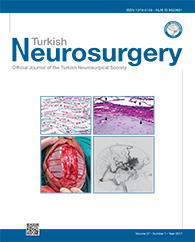2Erciyes University, Medical School, Department of Medical Oncology, Kayseri, Turkey 3
3Erciyes University, Medical School, Department of Neurosurgery, Kayseri, Turkey
4Erciyes University, Medical School, Department of Pathology, Kayseri, Turkey
5Erciyes University, Medical School, Department of Radiology, Kayseri, Turkey DOI : 10.5137/1019-5149.JTN.14889-15.1 AIM: The aim of this study was to assess the relationships among immunohistochemical staining patterns and prognostic factors in patients with non-functioning pituitary adenoma (NFPA).
MATERIAL and METHODS: The study included 103 patients who had undergone pituitary surgery for NFPAs. The prognostic factors evaluated were initial tumor size, cavernous sinus invasion, compression of the optic chiasm, recurrence, residual tissue, reoperation, and hypopituitarism.
RESULTS: Recurrence rates were higher for NFPAs with large initial tumor volume and preoperative cavernous sinus invasion. Tumor recurrence rates were higher for NPFAs positive (55.6%) than negative (10.3%) for luteinizing hormone (LH). Reoperation rate, but not recurrence rate, was higher in patients with tumors positive than negative for follicle-stimulating hormone (FSH) group. Recurrence and reoperation rates were lowest in patients with null-cell adenomas.
CONCLUSION: In contrast to previous studies, we observed a higher recurrence rate in LH-positive than in LH-negative adenomas. To our knowledge, this is the first study showing an association between LH positivity and poorer prognosis; and in addition, optimal outcomes in patients with null-cell adenomas. Thus, additional studies are required to assess the relationship between LH positivity and poor prognosis in patients with NFPAs.
Keywords : Non-functioning pituitary adenomas, Luteinizing hormone, Immunohistochemistry, Prognosis




